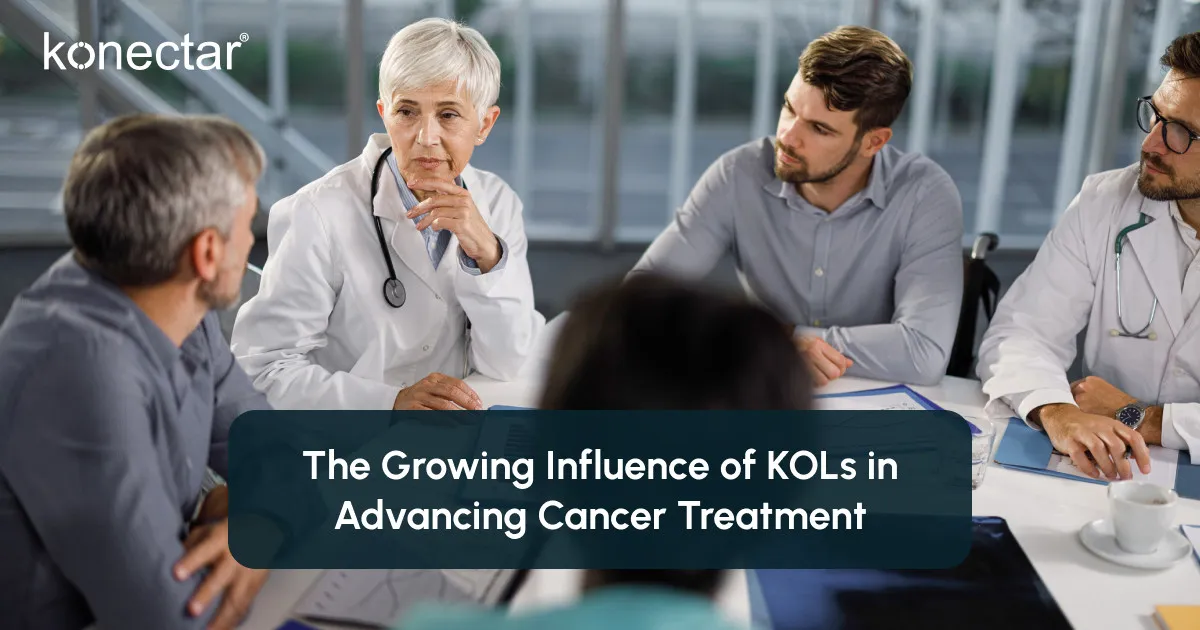31-03-2025
The Growing Influence of KOLs in Advancing Cancer Treatment

Key Opinion Leaders (KOLs) are pivotal in bridging groundbreaking scientific discoveries and everyday clinical applications in oncology. They’re the experts who sift through mountains of clinical data to extract the most meaningful and actionable insights.
Through public speaking engagements, collaborations with pharmaceutical companies, and advisory board participation, these KOLs ensure that the latest discoveries are translated from the lab to patient care.
In this article:
Collaborative Networks Driven by Oncologists
Oncologists frequently engage in partnerships that transcend geographic and institutional boundaries. These networks often include academic centers, pharmaceutical organizations, and regulatory agencies.
These partnerships foster a more holistic understanding of cancer and its complexities by uniting specialists across multiple fields—such as surgical oncology, radiation oncology, and immunology.
The insights generated within these networks are then shared through publications, conferences, and digital platforms, ensuring that vital information reaches practitioners in diverse regions.
Accelerating Clinical Trials and Research
Within these expansive networks, clinical trial initiatives gain momentum. By pooling resources, expertise, and patient cohorts, oncologists can rapidly design, implement, and analyze studies that explore treatment combinations.
Additionally, collaboration among oncologists, data scientists, and clinical operations teams enhances trial design, incorporating robust methodologies that account for both clinical effectiveness and patient quality of life.
Enhancing Patient Advocacy and Care Delivery
Oncologists work closely with advocacy groups and community representatives to integrate patient perspectives into research and treatment protocols. This engagement ensures that care models account not only for disease-specific metrics but also for factors such as management of side effects and long-term survivorship planning.
Ultimately, these integrated efforts help establish a comprehensive framework in which patient advocacy informs clinical decision-making and policy development, ensuring that progress in cancer research translates directly into measurable improvements in patient care and overall treatment experiences.
Leveraging KOL Digital Influence in Oncology
KOLs, traditionally known for their peer-reviewed publications and conference presentations, now employ online channels to reach broader audiences and influence clinical practice and public understanding.
In the digital sphere, oncology KOLs utilize professional networking sites, webinars, and online forums to disseminate the latest research findings and clinical guidelines. This approach amplifies their ability to share evidence-based insights and allows them to engage directly with peers across diverse geographic regions.
By facilitating real-time discussion on emerging therapies and best practices, KOLs extend their impact beyond academic institutions and medical conferences, strengthening international collaboration.
Rise of Digital Opinion Leaders (DOLs)
Alongside these established KOLs, a new cohort of Digital Opinion Leaders (DOLs) has emerged, recognized for their expertise and notable online presence. While they may share similar credentials and clinical backgrounds, DOLs use social media and digital content platforms to provide timely commentary on oncology topics.
Their capacity to translate complex scientific data into accessible formats has resonated with fellow clinicians and researchers, solidifying their status as credible voices in digital health communities.
Engaging Patients through Digital Channels
Patients are increasingly relying on online resources for information and support. The heightened digital visibility of both KOLs and DOLs enables more direct communication of symptom management strategies.
Such engagement empowers patients to ask informed questions, seek second opinions, and participate in shared decision-making. As a result, digital platforms foster a more transparent, patient-centered model of cancer care.
KOLs and Oncology Innovation
KOLs in oncology regularly review emerging technologies and therapies, providing critical evaluations that guide investment and research priorities. These thought leaders draw attention to the most promising innovations, unmet clinical demands, and patient preferences. This early input helps ensure that new devices, drugs, and diagnostic tools align with frontline clinical demands.
KOLs as Catalysts for Better Treatment Outcomes
KOLs in oncology are driving continuous improvement in patient care. They promote more effective treatment approaches by advocating a patient-centered model of care based on clinical evidence, catalyzing collaboration, and advocating for novel therapies.
FAQs
- What role do KOLs play in oncology?
They translate cutting-edge research into clinical practice and guide treatment standards.
- Who are Digital Opinion Leaders?
These are experts who leverage online platforms to share timely oncology insights.
- How does digital engagement benefit patients?
It empowers them with accessible information, enhancing shared decision-making.
- Why are KOLs essential for future oncology innovation?
They direct attention to emerging therapies, advocating evidence-based, patient-centered care.





